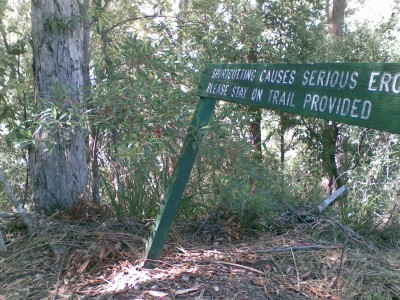- Details
- Written by Suzanne Ambler
- Category: Personal Reflections
- Hits: 1265
 A few months ago while on Home Assignment in Australia, I was visiting a supporting church in northern New South Wales. On my day off, I went to for a bush walk at a nearby Nightcap National Park. On the way down to the bottom I discovered a timber sign with the words, "Shortcutting causes serious erosion. Please stay on trail provided." The sign itself was not looking all that stable. A little bit further down the trail though, there was some serious erosion, where that part of the trail had slipped down the hillside. While I found it only a little difficult to navigate past that point, I wondered how someone less mobile than myself would have managed.
A few months ago while on Home Assignment in Australia, I was visiting a supporting church in northern New South Wales. On my day off, I went to for a bush walk at a nearby Nightcap National Park. On the way down to the bottom I discovered a timber sign with the words, "Shortcutting causes serious erosion. Please stay on trail provided." The sign itself was not looking all that stable. A little bit further down the trail though, there was some serious erosion, where that part of the trail had slipped down the hillside. While I found it only a little difficult to navigate past that point, I wondered how someone less mobile than myself would have managed.
Already the area around the sign was showing signs of erosion. The sign itself had a bit of a lean, and just a few metres further along a section of the path had slipped down the hillside. Obviously erosion was already making its mark felt, being helped along by those who had, for the sake of their own convenience, made shortcuts down or up the hillside.
It got me thinking - what does erosion look like in human society?
- Details
- Written by Jeff Callow
- Category: Personal Reflections
- Hits: 1293
It has been raining and raining and raining...... the field s are swamps (or lakes) and there is water around many homes and in some. Despite the puddles, we decided to grab the few hours of no rain last Saturday to go and check on some of the believers who live in villages just out of town and their families. Part way down the road into the first village there was water all over the road. Still, utes (pick-ups) can go through that level of water so on we went. We stopped at the end of the concrete - not trusting the gravel road and decided to walk the remaining 200m..... or should I say wade! There was 20-30cm of water over the road. The road really just looked like a continuation of the canal that was next to it - marked only by the grass poking out of the water at the side of the road!
s are swamps (or lakes) and there is water around many homes and in some. Despite the puddles, we decided to grab the few hours of no rain last Saturday to go and check on some of the believers who live in villages just out of town and their families. Part way down the road into the first village there was water all over the road. Still, utes (pick-ups) can go through that level of water so on we went. We stopped at the end of the concrete - not trusting the gravel road and decided to walk the remaining 200m..... or should I say wade! There was 20-30cm of water over the road. The road really just looked like a continuation of the canal that was next to it - marked only by the grass poking out of the water at the side of the road!
- Details
- Written by Belinda Callow
- Category: Personal Reflections
- Hits: 2036

- Details
- Written by Kennedy and Wendy Paizs
- Category: Personal Reflections
- Hits: 1256


